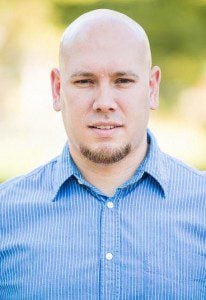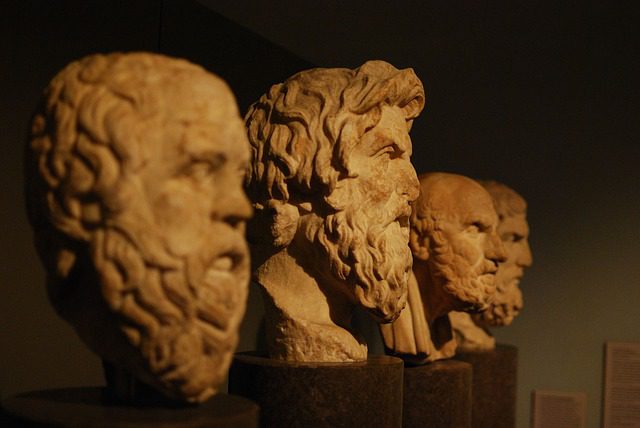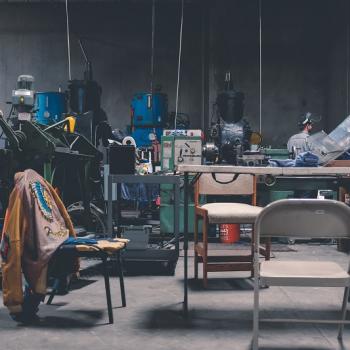Recently, in the 4th Republican debate, Senator Rubio made a comment in regards to raising the minimum wage in the U.S. Toward the end of his response he made the comment,
For the life of me, I don’t know why we have stigmatized vocational education. Welders make more money than philosophers. We need more welders and less philosophers.
I’ve worked in a skilled trade for 14 years and also have a degree from a liberal arts university in religion, a field that is akin to philosophy. I live at the intersection of Rubio’s rant.
While Rubio’s goal in his response seemed to be to paint vocational training in a better light, it seems that in skewering philosophy majors he actually reveals his own (possibly unintentional) stigmatization of philosophy as an educational pursuit–as some have interpreted it, his stigmatization of the liberal arts and humanities in general. His comment then is not a valid solution to the problem of stigmatized vocational training, but the same error on the opposite end of the spectrum.
I do agree with Rubio that vocational training has been devalued and not encouraged as a good option for kids coming out of high school. There is definitely a socio-academic funnel that has a one-size-fits-all traditional college destination in store for every high school graduate. If you don’t make it into the funnel, for any number of reasons, good luck. Or at least that’s how it seems. The sense is that it’s better to be in college, period. Even if you don’t know what to study. Even if you are taking on crippling debt. Even if you are great with your hands.
Just being in college as life’s next step is communicated as an end in itself, but it’s not. Some graduates should go to traditional college, some should go to vocational school. Some should take a gap year…or 3. What is important in high school and perhaps what is missing from Rubio’s view is that teens need to learn about themselves; how they’re wired, what their passions are, what they’re good at, etc. They also need to know what options are available, and both options need to be communicated as equally valid and valuable contributions to society. Parents and counselors need to better equip their kids in this way. This builds the American workforce.
Rubio’s comment also seems to set up up a false dichotomy regarding the importance and societal necessity of both skilled trades and liberal arts/humanities vocations. His implication was that professions such as welders are useful while philosophy is not. This seems to reveal a bent towards some brand of political materialism, that is, the idea that only things that can be seen and touched are real. Of course Rubio believes in things unseen, but for practical and political purposes he has certainly elevated the material and disregarded the immaterial. This ignores the training in critical thinking, planning, and problem solving needed for the administration (compared to the production staff) of every company. Even in the context of building up the American workforce, I think this is an incorrect approach. Skill and wisdom should be partners. Learning how to think is at least as important as learning how to do.
Finally, I‘ve been thinking simply about the etymology of the word “philosophy.” Love of wisdom is what it means in a literal translation. Recently, I heard Tim Keller, teaching pastor at Redeemer Presbyterian church in NYC, give a definition of wisdom as “Being so in touch with reality that you know what is the right thing to do in the vast majority of the situations that the moral rules don’t apply to.”
The need for wisdom is a human need, and to be certain, an American need. Why would ANYONE be so brazen to suggest that our country needs less wisdom? I don’t believe this is exactly what Rubio meant, but it is a natural consequence of his statements and posture. Welders and philosophers, and everyone in between, need wisdom in relational dynamics, personal finances, parenting, politics, entertainment choices, who we trust, and how we practice our faith, among countless other areas of daily life. The need for wisdom permeates every dimension of our common life together, no matter how we earn a paycheck.
My son, pay attention to what I say; turn your ear to my words. Do not let them out of your sight, keep them within your heart; for they are life to those who find them and health to one’s whole body. Prov.4:20-22.
 Jordan Dillon is the lead machinist at Strataflo Products Inc, in Fort Wayne Indiana, where he lives with his wife and 3 children. Strataflo produces high quality check valves and Jordan has been with them for 14 years. Jordan also graduated in 2008 from Huntington University with a BA in Bible and Religion. Jordan has experience in both manufacturing and historic house restoration among other Midwestern life experiences and enjoys writing about all aspects of life as they interface with God’s Kingdom. Read more of his writing here and here. Image: Pixabay.
Jordan Dillon is the lead machinist at Strataflo Products Inc, in Fort Wayne Indiana, where he lives with his wife and 3 children. Strataflo produces high quality check valves and Jordan has been with them for 14 years. Jordan also graduated in 2008 from Huntington University with a BA in Bible and Religion. Jordan has experience in both manufacturing and historic house restoration among other Midwestern life experiences and enjoys writing about all aspects of life as they interface with God’s Kingdom. Read more of his writing here and here. Image: Pixabay.














